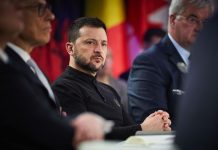European Union and Canadian leaders gathered in Ukraine on Monday in a display of solidarity as Kyiv marked the third anniversary of Russia’s full-scale invasion.
Russia launched its invasion on February 24, 2022, and has since seized over 2% of Ukrainian territory. The war has resulted in hundreds of thousands of deaths and displaced millions.
Ukrainian President Volodymyr Zelenskyy honored his country’s resilience while welcoming European Commission President Ursula von der Leyen and Canadian Prime Minister Justin Trudeau, among other high-ranking officials. Notably, no U.S. representative was present, highlighting growing uncertainty over Washington’s commitment to Ukraine.
“Three years of resistance. Three years of gratitude. Three years of absolute heroism of Ukrainians,” Zelenskyy stated. “I thank everyone who defends and supports it.”
Von der Leyen reaffirmed the EU’s unwavering support, writing on social media: “In this fight for survival, it is not only the destiny of Ukraine that is at stake. It’s Europe’s destiny.”
With concerns over a possible reduction in U.S. military aid, EU leaders are set to meet on March 6 to discuss decisions on Ukraine and European defense. On Monday, EU foreign ministers approved a 16th round of sanctions against Russia and rejected a swift ceasefire favoring Moscow.
However, Hungary, led by Prime Minister Viktor Orban, who maintains close ties with Russian President Vladimir Putin, opposed further sanctions and refused to support an increase in EU military aid. Hungarian Foreign Minister Peter Szijjarto reiterated that his country would not agree to additional military assistance, as former U.S. President Donald Trump continues pressuring Ukraine to negotiate peace with Russia.
U.S. officials recently held talks with Russian counterparts, while Trump and Zelenskyy engaged in a public dispute. Trump accused Ukraine of provoking the war and questioned Zelenskyy’s legitimacy. His proposed peace plan, aimed at reinforcing his image as a global dealmaker, has faced resistance from both Ukraine and Russia.
On Monday, Moscow dismissed the idea of a quick ceasefire, calling it “unacceptable.” Russian Deputy Foreign Minister Sergey Ryabkov warned that a temporary truce without a lasting resolution would only lead to renewed conflict, with serious consequences for U.S.-Russia relations.
Meanwhile, Ukraine signaled on Sunday that a controversial proposal allowing Washington to claim $500 billion in profits from Ukrainian rare minerals has been withdrawn, with discussions now shifting toward an alternative deal.
Zelenskyy also addressed a forum in Kyiv, declaring that he would step down if it meant securing peace.
“If you need me to leave this chair, I am ready to do that, and I also can exchange it for NATO membership for Ukraine,” he stated.












